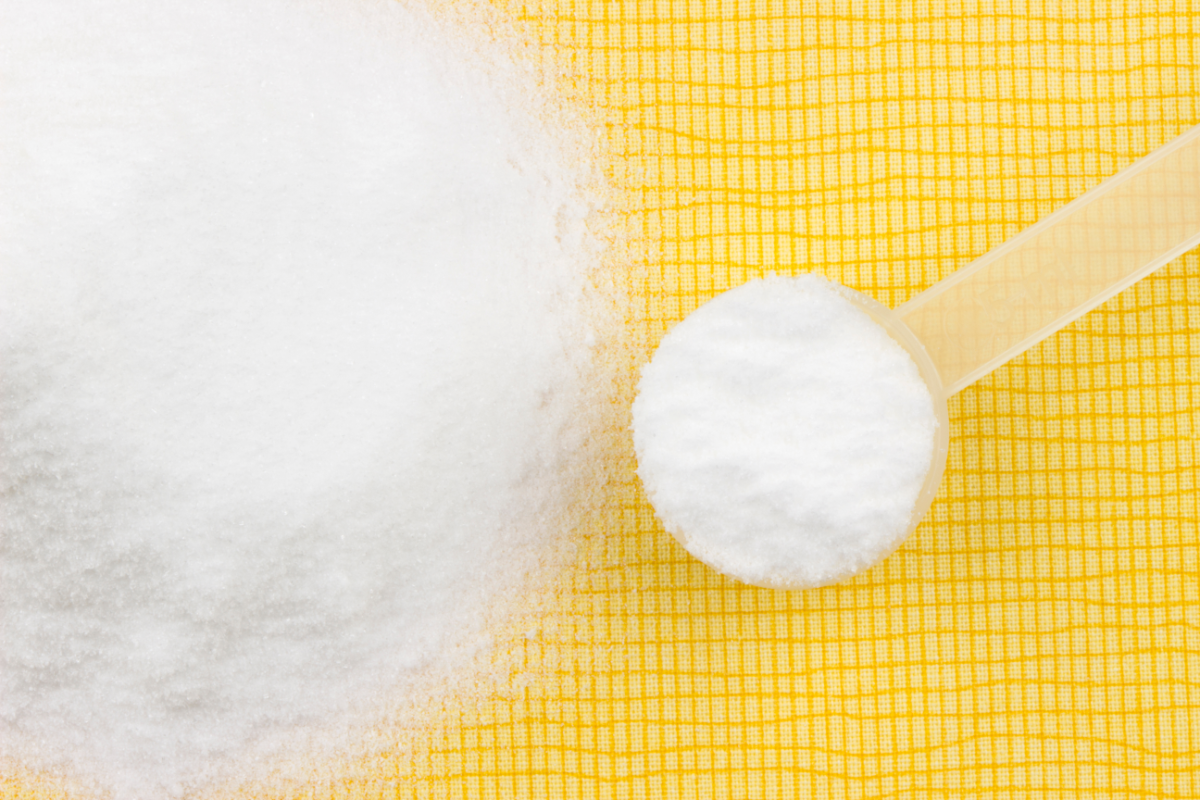Glutamine, a fascinating and versatile amino acid, occupies a central place in the field of health and well-being. Essential for many bodily functions, it is attracting growing interest among researchers and health enthusiasts. But what exactly is the role of glutamine in our bodies, and how can it help to improve our overall health?
In this article, we take a deep dive into the world of glutamine to explore its many benefits. From its ability to support the immune system and to accelerate muscle recovery recovery after exercise, to its crucial role in intestinal health and potentially in weight loss glutamine is an essential ally for your well-being.
We’ll also look at how to effectively incorporate glutamine into your daily diet and in which form it is most beneficial. Whether you’re an athlete looking to optimise your performance and recovery, or simply someone seeking better overall health, this article offers a comprehensive overview of the incredible benefits of glutamine, backed up by cutting-edge scientific research.
What is glutamine?
Glutamine is a non-essential amino acid, which means our bodies can produce it naturally. But why is it so important? What is it really used for?
Glutamine and the human body
In the human body, glutamine serves a number of essential functions. In particular, it is used as source of energy by intestinal cells and the immune system. In addition, glutamine helps to form proteins, which are essential for the repair and growth of body tissues.
Essential functions of glutamine
As a vital molecule in our body, glutamine fulfils a multitude of functions. Here’s a detailed overview of the main ones:
- Energy production: Our body is an incredibly complex and diverse machine, with each cell fulfilling its specific role. Among the millions of cells that populate our body, some, such as immune system and intestinal cells, preferentially use glutamine as an energy source. This preference stems from glutamine’s unique ability to easily enter the cellular energy cycle, known as the Krebs cycle. Consequently, glutamine is essential for keeping these cells in top shape and functioning efficiently.
- Protein synthesis: Proteins are the fundamental building blocks of our body. They are an essential part of all our cells and tissues, including our muscles, hair, skin and nails. Glutamine plays a crucial role in the synthesis of these proteins. In fact, it is the main amino acid transported to and released from muscle, acting as a regulator of protein metabolism. By aiding tissue repair and growth, glutamine plays an essential role in muscle maintenance and growth, as well as post-exercise recovery.
- Regulation of body acidity: Our bodies need to maintain a precise acid-base balance in order to function properly. This is where glutamine comes in. It can be converted into glutamate, another form of amino acid, and ammonia. Ammonia is a base that can help neutralise excess acid in the body, helping to maintain the pH balance. This role of glutamine is particularly important for the kidneys, which are one of the main organs involved in regulating the body’s acid-base balance. By providing a source of ammonia, glutamine helps the kidneys to eliminate excess acid from the body.
These three major functions demonstrate just how essential glutamine is to our health and well-being. They also underline why it is important to maintain adequate levels of glutamine in our bodies, whether through diet or supplementation.
Glutamine in our diet
Glutamine is present in a variety of foods, including meat, fish, eggs, dairy products and certain vegetables such as spinach and parsley. However, the question arises: do we need glutamine supplements?
Glutamine-based supplements
Glutamine supplements have gained in popularity in recent years, mainly in fitness and bodybuilding circles. But what can they do for us?
Supplements for physical exercise
Intense physical activity, whether running, weight training or any other form of exercise, puts a huge strain on the body. Muscles contract and relax repeatedly, sustaining minor damage each time. This is where glutamine comes in, playing a decisive role in the recovery process and improving sporting performance. (2)
- Glutamine and post-training recovery
Post-exercise recovery is an essential component of any training routine. It allows the muscles to repair, strengthen and prepare for the next session. After intensive training, glutamine levels in the body can fall considerably. This can hamper the recovery process and prolong the period during which you may experience muscle soreness after training.
That’s where glutamine supplements come in. By helping to replenish glutamine levels, these supplements can promote faster recovery, reduce muscle soreness and improve performance in the next training session.
In addition, a Cochrane review examined the effects of glutamine supplementation in critically ill adults and after major surgery. The results showed a reduction in infectious complications and a shorter hospital stay. (1)
- Glutamine and muscle repair
Glutamine promotes protein synthesis, a crucial process for the repair and growth of muscle tissue damaged during training. In other words, it helps repair micro-tears in muscle fibres caused by intense exercise. The faster you can repair these fibres, the less muscle soreness you’ll feel after training and the quicker you’ll be able to get back to your training routine.
What’s more, by supporting immune function, it can also help prevent illnesses and infections that could prevent you from training. In conclusion, whether you’re a professional athlete or simply someone who enjoys exercise, glutamine supplementation can be a valuable addition to your recovery and performance regime.
Which supplements for the immune system?
As well as being beneficial for physical activity, it can also support our immune system. How does it do this?
Glutamine and immunity
Our immune system uses it as a source of energy. During periods of intense stress, such as illness or injury, the demand for glutamine increases. Therefore, taking glutamine supplements can help support a robust immune system.
Glutamine and weight loss
Although our article focuses primarily on the benefits of glutamine for muscle recovery and immune support, recent research also suggests a link between glutamine and weight loss.
- Effects on Body Fat Reduction: Studies have shown that glutamine can contribute to more effective weight loss, particularly by reducing waist circumference and abdominal fat in overweight or obese people”.
- Mechanism of Action: It is suggested that glutamine may influence weight loss through its role in intestinal health and metabolism.
- Nutritional considerations: Incorporating glutamine into a balanced diet, combined with regular physical activity, could therefore be a beneficial strategy for those seeking to lose weight.
However, it is important to note that glutamine should not be seen as a miracle solution for weight loss, but rather as a complement to a healthy, balanced lifestyle.
Comparison between Glutamine and Creatine
Of course, here’s a table comparing the benefits of glutamine and creatine, two popular supplements in the field of sports nutrition and health.
| Criteria | Glutamine | Creatine |
|---|---|---|
| Definition | A non-essential amino acid, produced naturally by the body. | An organic compound, synthesised naturally in the body, also found in certain foods. |
| Main roles | – Supports the immune system – Helps muscle recovery – Maintains the integrity of the intestinal wall. | – Improves sporting performance, particularly in short, intense efforts – Increases muscle strength – Supports muscle growth. |
| Benefits for sport | – Reduces fatigue – Speeds up post-exercise recovery – May help prevent injuries. | – Increases capacity for rapid energy production – Improves muscular strength and power – May help increase muscle mass. |
| Health use | – May improve intestinal health – Supports immune function – Used in recovery from illness or injury. | – May improve cognitive function in the elderly – Potential aid in certain neurodegenerative diseases – Used in certain muscular rehabilitation contexts. |
| Food sources | – Meat – Eggs – Dairy products – Certain vegetables (spinach, parsley). | – Red meat – Fish – Dairy products. |
| Side effects | Generally well tolerated; may cause bloating or cramps in rare cases. | May cause weight gain due to water retention, muscle cramps or digestive problems in certain cases. |
| Recommendations for use | – 5 to 10g per day for post-exercise recovery – Higher doses recommended in cases of intense physical stress or illness. | – Loading phase: 20g per day for 5-7 days, followed by 3-5g per day – Without loading phase: 3-5g per day. |
| Special features | – May be beneficial for individuals suffering from intestinal disorders – Important during periods of physical stress or illness. | – Effectiveness may vary from one person to another – Water retention may be a factor for some athletes. |
This table provides a general overview of the differences and similarities between glutamine and creatine, but it is always advisable to consult a health professional before starting any supplementation regime.
FAQ
- What is the recommended dose of glutamine?
The recommended dose varies according to the individual and their specific needs. For post-training recovery, a dose of 5 to 10g per day is commonly recommended.
- Do glutamine supplements have any side effects?
Glutamine is generally well tolerated, but as with any supplement, it is possible to experience side effects such as bloating or cramps. It is always advisable to consult a health professional before starting any supplementation regime.
- Can I take glutamine if I’m vegetarian or vegan?
Yes, there are supplements derived from non-animal sources. Just be sure to check the product label.
- What foods are rich in glutamine?
Meat, fish, eggs and dairy products are rich in glutamine. For those following a vegetarian or vegan diet, lentils, nuts and certain vegetables such as spinach and parsley are also good sources of glutamine.
- Can glutamine help with weight loss?
There is no direct evidence that glutamine helps with weight loss. However, as it contributes to intestinal health and muscle recovery, it can indirectly support weight loss efforts.
- What is glutamine used for in bodybuilding?
In bodybuilding, it promotes the recovery and repair of muscle tissue after intense training. It can help reduce muscle soreness and improve performance during the next training session.
Glutamine, this versatile amino acid, plays a vital role in the smooth functioning of our bodies. Whether you’re an athlete looking to improve your performance, someone who pays close attention to their immune system, or simply someone curious to understand the importance of nutrition for health and well-being, the answer to the question “What’s glutamine good for?” is sure to pique your interest.
So the next time the subject of glutamine comes up, you’ll have all the keys you need to understand its vital role. And who knows? You might even be tempted to incorporate glutamine supplements into your diet to optimise your health and performance. From now on, glutamine will hold no secrets for you!
References
- https://www.cochrane.org/fr/CD010050/EMERG_supplementation-en-glutamine-des-adultes-malades-en-phase-critique
- https://repository.lsu.edu/cgi/viewcontent.cgi?article=4782&context=gradschool_theses
- https://www.ncbi.nlm.nih.gov/pmc/articles/PMC6471297/







